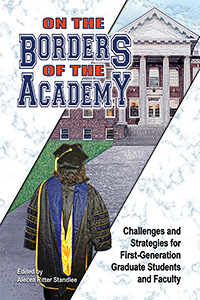Research Experience
As a scholar, I examine the intersections of techno-mediated communication technologies, social inequality and interpersonal relationships. I am particularly interested in how social media, text messaging, and other technologies are changing normative practices among young adults.
My current digital culture scholarship explores the implications of the integration and normalization of online communication technologies in the lives of Gen Z. As a qualitative theorist, I utilize in-depth interviewing and digital ethnography to gather data and develop theories that consider the relationship between online/offline behavior and cultural norms in this cutting-edge field of study.
Research Specializations
- Digital Sociology and Online Behavior
- Gender and Sexuality
- First-Generation Academics
- Sociological Theory
- Qualitative Methods and Research Ethics
- Social Inequality and Stratification
Digital Culture and Online Behavior Research
 The widespread use and integration of internet devices alongside the increased use of algorithmic systems challenges what the foundational concepts of “privacy” and “personal identity” mean in an online world. I seek to contribute to this discussion by examining the perceptions and practices of privacy and self-representation in digital spaces among college age adults, 18-24. Specifically, I consider the impact of the strategic interventions of corporate and governmental platforms to collect, distribute, manage, and utilize individual level data on participants’ information consumption, individual identity representation, and group affiliation. The widespread use and integration of internet devices alongside the increased use of algorithmic systems challenges what the foundational concepts of “privacy” and “personal identity” mean in an online world. I seek to contribute to this discussion by examining the perceptions and practices of privacy and self-representation in digital spaces among college age adults, 18-24. Specifically, I consider the impact of the strategic interventions of corporate and governmental platforms to collect, distribute, manage, and utilize individual level data on participants’ information consumption, individual identity representation, and group affiliation.
The use of social media and other “big data” internet platforms has accelerated corporate and governmental interest by creating an online data market that is worth billions of dollars. This has had a profound impact on the perceptions of privacy and surveillance in online spaces. Working with student researchers during the 2018-2019 academic year, we conducted 70 in-depth behavioral and attitudinal interviews of Gettysburg College undergraduate students in the U.S. about their online behaviors. The project focused on how college students integrate technological communication use into their social lives, within a cultural environment of digital surveillance.
I will use this data to explore three principle research questions:
- To what degree do U.S. college students understand contemporary patterns of corporate and governmental surveillance as a part of their digital social environment?
- What strategic usage patterns, regarding platforms and information distribution, are impacted by individual level understanding(s) and expressions of the concept of privacy?
- How does public policies, including legal protections, shape social attitudes?
A preliminary analysis of the research illustrated that students seem to conceptually juggle the understanding that their activities are under constant surveillance online with a definition of privacy rooted in the strategic control of information. With an interesting interplay happening between students understanding of online surveillance and personal privacy, my research has found that college students engage in partial and strategic representations of their personal identity online. This in turn impacts the students’ self-identity and group affiliation in offline contexts.
Individual experiences and social networks online coexisting within a profit-driven and governmental surveillance marketplace result in complex social norms and individual responses. Due to recent journalistic visibility, participants found themselves to be increasingly informed about the nature of online surveillance and their own position within the system. As with any social system, response and management of this information varied, but common themes emerged. Student research participants discussed their use of privacy controls and risk assessment in their self-disclosure. When structural controls were perceived to be inadequate or excessively restricting by the students, the behavioral controls took a rhetorical turn. Participants rationalized their responses to surveillance and privacy, redefining and adapting their perceptions of the concepts to create a positive self-narrative.
I found that the greater participants awareness of data collection, the more they desired to manage access to their personal data. Specifically, participants who indicated the highest awareness typically responded with adaptive strategies to online surveillance. These strategies include creating a carefully controlled online identity to fit a particular self-representation narrative, limited posting and sharing of information, or using VPNs and web browser controls to limit data collection. Often, they used a combination. Other participants discussed resistance stratagems to maintain online privacy, but did so with a sense of fatalism, acknowledging them to be largely ineffective with current U.S. public policies.
First-Generation College Students Research
 Significant research has been done on first-generation college students, chronicling the challenges they face. However the research largely ends at the completion of an undergraduate degree. Very little research addresses the challenges these burgeoning academics face as they continue on to graduate school and even less information about the ones that remain in the academy as first-generation college faculty members. Significant research has been done on first-generation college students, chronicling the challenges they face. However the research largely ends at the completion of an undergraduate degree. Very little research addresses the challenges these burgeoning academics face as they continue on to graduate school and even less information about the ones that remain in the academy as first-generation college faculty members.
As a first-generation academic myself, I worked to address this research gap by producing an edited volume titled, On the Borders of the Academy: Challenges and Strategies for First-Generation Graduate Students and Faculty. Serving as the book's editor, I have brought together work surrounding the unique challenges faced by these individuals within and across lines of race, class, gender, and disciplinary specialty. Particular attention is given to strategies that may be successfully employed by first-generation and working-class graduate students. I brought together both original and theoretical research from academics across the country. Topics covered include: academic preparedness, professionalization, economics, social capital, family relationships, and mentoring strategies. The book was released by the Syracuse University Graduate Press in the fall of 2018 and is available for sale wherever fine books are sold.
First-generation college students continue to face academic, financial and cultural challenges, even as a college education is ever more necessary for career achievement. Leaders and faculty members in the academy, including those who are first-generation themselves, play an important role in the development of policies and practices to help these students face those challenges. I continue to research ways colleges can retain first-generation students and allow them to reach their potential. I wrote a short piece on the topic, “Policies and Practices to Help First-Generation College Students Succeed,” published in Inside Higher Ed, April 2019. A webinar sponsored by PaperClip Communications titled, “First Generation Student Programming: Create Accessible Programs to Support Engagement, Retention & Completion,” followed in July 2019. I served as a sounding board to Susan Lieberman for her book, CRACK THE CODE: A Guide to College Success for First Gens, published in 2020. I was invited to share my expertise at Texas Woman's University in 2021 in a talk titled, "Removing Academic Barriers: Supporting First-Generation College Student Success." An outgrowth of this work has been a desire to make higher-education more equitable for all. To that end, I have become an advocate for OER, presenting often on the benefits of things like open access textbooks. I am committed to creating an inclusive and diverse campus and I will seek out new opportunities to support students in whatever form that may take.
Previous Research Summary
 Using content analysis techniques, my early research examined how the U.S. government employed the mass media during WWII to shape attitudes around gender and labor. In the article, “Shifting Spheres: Gender, Labor and the Construction of National Identity,” published in the Minerva Journal of Women and War, I argue that WWII wartime propaganda posters helped expand the definition of "home" to include the national "home front," thus maintaining an ideological separation from the public sphere of international and military action. This conceptual transformation allowed the participation of women in the labor market while supporting the ideological location of women within the homesphere, maintaining (and reinforcing) the hierarchical gendered separation of public and private domains. Using content analysis techniques, my early research examined how the U.S. government employed the mass media during WWII to shape attitudes around gender and labor. In the article, “Shifting Spheres: Gender, Labor and the Construction of National Identity,” published in the Minerva Journal of Women and War, I argue that WWII wartime propaganda posters helped expand the definition of "home" to include the national "home front," thus maintaining an ideological separation from the public sphere of international and military action. This conceptual transformation allowed the participation of women in the labor market while supporting the ideological location of women within the homesphere, maintaining (and reinforcing) the hierarchical gendered separation of public and private domains.
As my research shifted to contemporary communication technologies, it became necessary to look at different methodological approaches to online ethnography. Collaborating with faculty at three other institutions, we co-authored the article, “Ethnographic Approaches to the Internet and Computer-Mediated Communication.” The work, published in the Journal of Contemporary Ethnography, examines how the online environment requires adjustments in how ethnographers define the setting of their research, conduct participant observation and interviews, obtain access to settings and research subjects, and deal with the ethical dilemmas posed by the medium. The article remains one of the most widely cited works on online ethnographic research.
My dissertation research considered the ways in which communication technologies such as social media and text messaging are used by undergraduate college students to establish, negotiate and maintain interpersonal relationships. Using in-depth interview and online participant observation, I explored the relationship between technological communication, social behavior, and social networks. My research finds that with the incorporation of devices such as smartphones into interpersonal relationships, combined with a discourse of rational labor practice that values speed, there is an increased expectation of frequency of contact. This has resulted in normalized social hyper-connection and new cultural definitions of intimacy and privacy for the students.
I expanded on the concept of social hyper-connection in my article, “Technology and Making Meaning in College Relationships: Understanding Hyper-Connectivity.” Published in the Qualitative Sociology Review, the piece explores how the use of communication technology has transformed social interactions and the sense of self. I explore how these individuals construct understandings of presence, absence, connection and disconnection within peer social groups and intimate relationships, indicating the emergence of a culture of social hyper-connection. The article suggests that technological developments have enabled forms of interaction that encourage frequent connection and the idealization of constant communication among participants. These findings further indicate that the normalization of social hyper-connection may have impacts on relationship practices and constructions of identity among participants.
This led my research to focus on the practice of “doing homework,” in which college students utilize social media to investigate potential friends and use that data to determine if a relationship continues, both online and offline. The article, “Friendship and Online Filtering: The Use of Social Media to Construct Offline Social Networks,” published in the highly-ranked journal New Media & Society, finds the establishment of offline relationships includes the use of social media profiles to collect social and political attitude data on potential friends. Participants report the use of such data as essential to their decision-making processes about friendship, resulting in an increase in social and political homogeneity within offline social networks. These findings contribute to our ongoing understanding of the role of informational echo chambers within a technologically integrated social environment.
astandle@gettysburg.edu • Gettysburg College • (717) 337-6194
|

